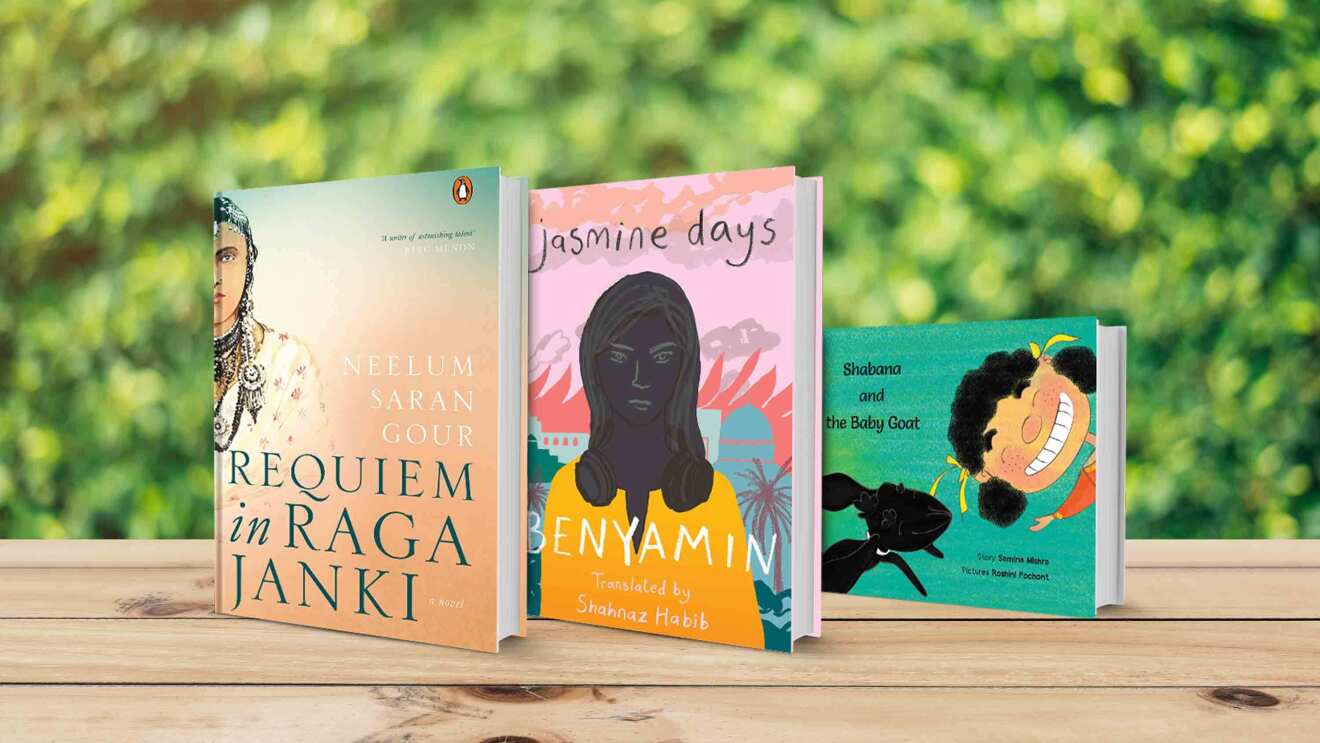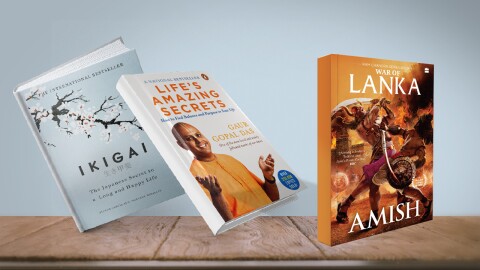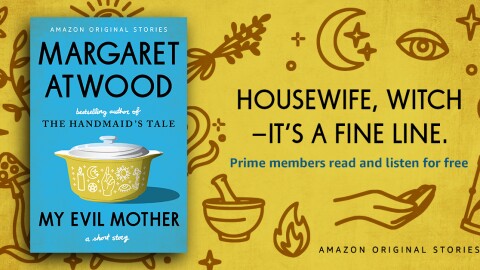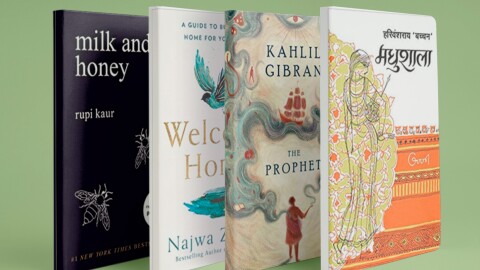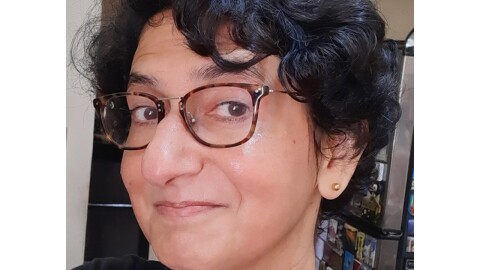2018 was a year in which the line between right and wrong ran dangerously thin the world over. Political shenanigans, economic disparity, social injustice, religious bigotry, sexual assault and environmental disasters played out in front of our eyes almost as if they mirrored the best of dystopian fiction. Books, fortunately, have always helped make sense of the world, offering powerful philosophies for life and living. This year too, books have highlighted struggles and inequities, both personal and universal, offering insight, perspective, understanding, and hope.
From brilliant debuts to powerful memoirs, from seminal non-fiction to trailblazing translations, from sparkling children’s books to empowering YA reads, this year’s best books speak to our fractured times, inviting readers into the conversation and helping them articulate their thoughts and strengthen their voices.
2018 was a year in which the line between right and wrong ran dangerously thin the world over. Political shenanigans, economic disparity, social injustice, religious bigotry, sexual assault and environmental disasters played out in front of our eyes almost as if they mirrored the best of dystopian fiction. Books, fortunately, have always helped make sense of the world, offering powerful philosophies for life and living. This year too, books have highlighted struggles and inequities, both personal and universal, offering insight, perspective, understanding, and hope.
From brilliant debuts to powerful memoirs, from seminal non-fiction to trailblazing translations, from sparkling children’s books to empowering YA reads, this year’s best books speak to our fractured times, inviting readers into the conversation and helping them articulate their thoughts and strengthen their voices.
-
1FICTION: Requiem in Raga Janki by Neelum Saran Gour (Penguin India)
Based on the life of the Hindustani singer Janki Bai Illahabadi, Neelum Saran Gour’s book is a riveting account of a woman who grew up in a nautch house, was sold into prostitution but eventually went on to become a renowned singer, performing at mehfils and durbars across India. The first artist to be recorded by HMV, Janki Bai’s life was at once glorious and tragic. Gour’s brilliant prose and keen knowledge of Hindustani music helps her strike the right note even as the reader is swept into a saga of love, loss and historical legend.
-
2FICTION: No Presents Please by Jayant Kaikini (HarperCollins India)
A collection of sixteen stories set in Mumbai, this translation of Jayant Kaikini’s work from the Kannada shows us just why he a master of the short story form. Mumbai is not a city viewed from a distance by the author, he is smack in the middle of it, in its cafes and chawls, in its cinema halls and film studios, amidst friends, lovers, strangers, stuntmen and streetwalkers. Translated fluidly and evocatively by Tejaswini Niranjana, these stories bring alive the lives of people in the nooks and corners of a big Indian city, putting us into their skins and making us experience the tragicomic pathos of their lives.
-
3FICTION: Jasmine Days by Benyamin (Juggernaut)
Sameera Parvin from Pakistan immigrates to an unknown Middle Eastern country with her father and other relatives and works as a radio jockey there. Her happiness in the new city is short-lived as the country is on the brink of a revolution and is slowly being torn apart by religious conflict. Ensconced within this framework are themes of liberty, tyranny, religious intolerance, women’s rights and the dilemmas faced by migrants. Dexterously translated from the Malayalam by Shahnaz Habib, this immersive novel throws up and reflects upon some of the most complex issues of our times.
-
4FICTION: When I Hid my Caste by Baburao Bagul (Speaking Tiger)
The protagonist of the first story in this searing collection does not reveal his caste to his co-workers in the hope of social equity. In yet another story, a young man refuses to do his parents’ bidding and take up the caste-prescribed job of manual scavenging. A third story highlights the horrifying condition of women subjected to the lives of devadasis. Baburao Bagul’s debut collection, Jevha Mi Jaat Chorli Hoti, written in Marathi in 1963, portrays a gritty, brutal, casteist reality that is India. Brilliantly translated by award-winning author and translator Jerry Pinto, this is a book that urges readers to “rage, rage against the dying of the light.”
-
5FICTION: All the Lives we Never Lived by Anuradha Roy (Hachette India)
Myshkin is nine years old when his mother Gayatri leaves him and his father to embark on a new life with an Englishman. After his mother goes away, Myshkin’s life is spent waiting and wanting – waiting for his mother’s letters to come and wanting her to come back. Narrated from the perspective of Myshkin who is now sixty and trying to understand why his mother made the choices she did, the story compassionately examines the consequences of Gayatri’s decision without condemning her for it. Personal history and political history interweave seamlessly in this elegantly written novel about the impact of war and nationalism on a family and a country.
-
6CHILDREN'S AND YOUNG ADULTS: Shabana and the Baby Goat by Samina Mishra (Tulika Publishers)
Shabana loves Kajri and Kajri loves Shabana and they are best friends forever! The problem begins when Kajri the baby goat starts to chew everything in sight – Dadi’s palak, Masterji’s book and even Phuppo Jammo’s burkha! Now Shabana must come up with a plan to put Kajri’s chewing skills to good use. And she does, just like every good friend would. Visual text and expressive illustrations combine to make you smile as you turn every page. Not to mention, gladden the heart to see diverse people and cultures represented in our books for young readers.
-
7CHILDREN'S AND YOUNG ADULTS: Mother Steals a Bicycle and Other Stories by Salai Selvam (Tara Books)
In the first story, a mother steals a bicycle even if she doesn’t know how to ride it; she and her friends take the more adventurous forest route to school in the next; in yet another story she teaches herself how to swim so she can get from one shore to the other without breaking an egg wrapped on her head in a towel! And there are no punishments for doing the things that she is not supposed to! Narrated by her 11-year-old daughter, who believes her mother’s tales are way better than any of the 27 fantasy novels in her school library, this exuberant collection of stories makes growing up in a village in South India seem like the coolest thing under the sun!
-
8CHILDREN'S AND YOUNG ADULTS: Ahimsa by Supriya Kelkar (Scholastic)
Set in 1942 against the backdrop of the Quit India Movement, Ahimsa tells the powerful story of India’s freedom struggle through 10-year-old Anjali’s eyes. Anjali’s privileged world comes apart when her mother decides to quit her cushy job to join the fight for independence. Issues of caste, religion and gender are deftly introduced into the narrative, most of which are relevant even today. From being in a communal riot to the arrest of a parent, from seeing a best friend on the ‘other’ side of the divide to understanding the power of non-violent resistance, this tightly-plotted coming-of-age story engages, enthuses and empowers its readers.
-
9CHILDREN'S AND YOUNG ADULTS: A Brush with Indian Art by Mamta Nainy (Penguin)
A delightful little book that introduces children to the evolution of Indian art from prehistoric paintings to contemporary canvases. Replete with stories and anecdotes about various artistic traditions of India – the first cave paintings, Mughal miniatures, the religious depictions at Tanjore, different schools of art and significant movements in art history – Mamta Nainy demystifies art and makes readers think about how and why they respond to it.
-
10CHILDREN'S AND YOUNG ADULTS: Year of the Weeds by Siddhartha Sarma (Duckbill)
Korok, a young, gentle Gond boy, tends the garden in the forest officer’s bungalow in Deogan village in western Odisha. He often lingers around the sacred hill under which his mother is buried. He journeys by bus to the prison where his father has been wrongly jailed. One day, the government tells the Gonds that they have to leave their village because a company wants to mine their sacred hill for bauxite. The Gonds resist. This is when Korok join hands with Anchita, the forest officer’s privileged daughter, to come up with a plan to prevent the community from being displaced. Can the two youngsters take on the might of the government, the bureaucracy, the police and the private corporation? Based on the landmark Niyamgiri movement in Odisha, this compelling young adult novel by Siddhartha Sarma will open readers’ eyes to injustices in society and perhaps act as a catalyst for change.
For more memorable books of 2018, click here


